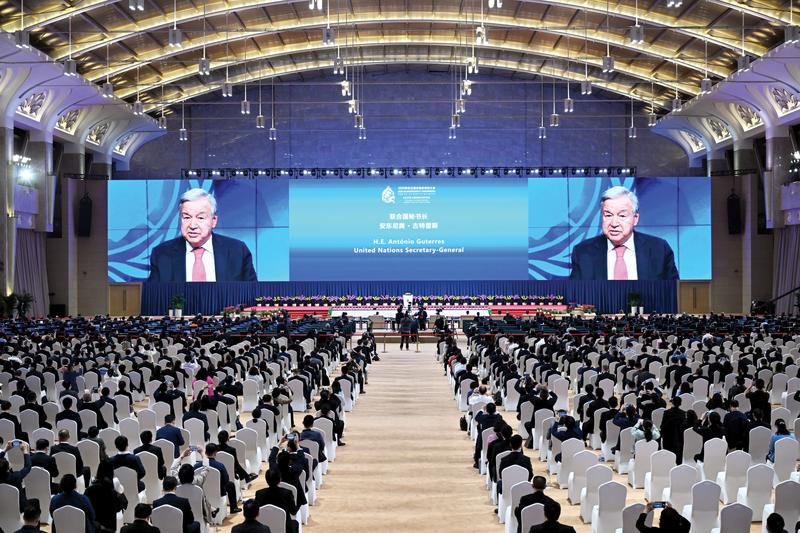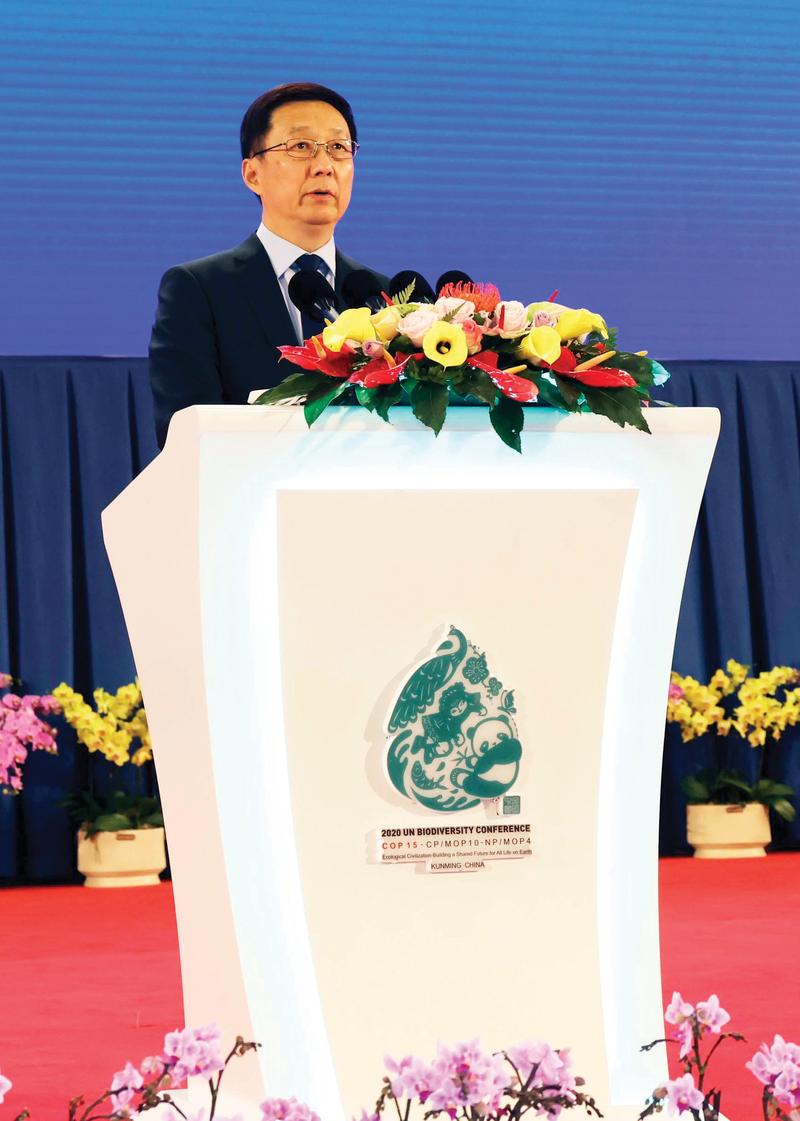 United Nations Secretary-General Antonio Guterres on Oct 12 calls for global consensus on ending the biodiversity crisis while addressing the 15th meeting of the Conference of the Parties to the United Nations Convention on Biological Diversity (COP15) by video. (CHEN YEHUA / XINHUA)
United Nations Secretary-General Antonio Guterres on Oct 12 calls for global consensus on ending the biodiversity crisis while addressing the 15th meeting of the Conference of the Parties to the United Nations Convention on Biological Diversity (COP15) by video. (CHEN YEHUA / XINHUA)
World leaders called for global awareness, broad consensus and concrete actions to preserve biodiversity as they participated in a United Nations conference held in China this week.
The leaders, in their speeches via video during the 15th meeting of the Conference of the Parties to the UN Convention on Biological Diversity, or COP15, pledged to make bold efforts at a time when the world is facing a worsening crisis of biodiversity loss.
UN Secretary-General Antonio Guterres on Oct 12 called for global consensus on ending the biodiversity crisis that has threatened the survival of humankind.
“Our two-century-long experiment with burning fossil fuels, destroying forests, wilderness and oceans, and degrading the land, has caused a biosphere catastrophe,” he said in his speech via video.
The UN chief described humanity’s interference with nature as a “suicidal war” and stressed that “we are losing” it.
“The rate of species loss is tens to hundreds of times higher than the average of the past 10 million years — and accelerating. Over a million species of plants, mammals, birds, reptiles, amphibians, fish and invertebrates are at risk — many within decades,” Guterres said.
Themed “Ecological Civilization: Building a Shared Future for All Life on Earth,” the meeting is the first global conference convened by the UN to highlight ecological civilization, a philosophy proposed by China.
To reverse biodiversity loss, the leaders participating in COP15 urged a nature-based approach to develop the global economy.
Stressing that the greatest impact of ecosystem collapse would be on developing countries, Guterres called for support to them, including significant financial resources and technology transfer.
Russian President Vladimir Putin noted that “objectives of nature conservation cannot be successfully addressed by any country individually. This is a common task for all states, for all humankind, without exaggeration”.
Egyptian President Abdel-Fattah al-Sisi on Oct 12 called for deeper awareness of the importance of protecting biodiversity that is closely related to human beings and their surrounding ecological environment.
“We are in a delicate period in human history,” al-Sisi said in a video message.
“We are still dealing with the negative impact of the epidemic in various fields,” he said.
“If countries around the world do not have a deeper awareness of the importance of protecting biodiversity and ecosystem security for our future ... we will be faced with a global disaster,” al-Sisi added.
Egypt held the presidency of COP14, and has made unremitting efforts to formulate the “post-2020 global biodiversity framework” and set achievable goals supported by a clear implementation mechanism, he said.
Turkish President Recep Tayyip Erdogan urged countries bearing “the historical responsibility” to be “the first to take action in the face of this threat.”
“The destruction of biodiversity results in a polluted environment, as well as scarcity of food and water. This situation causes conflicts and forces people to migrate,” Erdogan said in his speech via video.
“Environmental degradation is one of the reasons that turned the Mediterranean, the cradle of civilizations, into a refugee graveyard,” Erdogan said.
In his speech, French President Emmanuel Macron called for the adoption of an ambitious global framework that meets the challenges and expectations of various societies.
“It is up to our generation to reverse the trend and recreate virtuous synergies with nature,” he said.
It is necessary to forge a direct link between the health of nature and humanity, Macron said, underlining that “we will not live healthy on a sick planet.”
Macron said he expects to attend the second part of COP15, which will take place in Kunming during April 25-May 8 next year, in person.
If the international community wants a successful economy and future and to create jobs, “restoring and conserving our land and ocean is critical,” he added.
 Chinese Vice-Premier, Han Zheng, also a member of the Standing Committee of the Political Bureau of the Communist Party of China Central Committee, calls for action to build a community for all life on Earth at the leaders’ summit of COP15 in Kunming, capital of Southwest China’s Yunnan province, on Oct 12. (LIUWEIBING / XINHUA)
Chinese Vice-Premier, Han Zheng, also a member of the Standing Committee of the Political Bureau of the Communist Party of China Central Committee, calls for action to build a community for all life on Earth at the leaders’ summit of COP15 in Kunming, capital of Southwest China’s Yunnan province, on Oct 12. (LIUWEIBING / XINHUA)
Preserving biodiversity will not only ease climate crisis but become “a win for people and our economies”, Costa Rican President Carlos Alvarado Quesada said in his video address.
“As we are facing the devastating consequences of COVID-19, we must think beyond the present and put nature in the center of our economies,” he said.
Stressing that 55 percent of global gross domestic product depends on high-functioning biodiversity and ecosystem services, Alvarado said the economic benefits of protecting biodiversity outweigh the costs.
Sadyr Zhaparov, president of Kyrgyzstan, a country with 95 percent of the land covered by mountains, announced a five-year program to ensure the sustainable development of mountain regions.
“Kyrgyzstan is open and ready for active international cooperation, and only by joint efforts we could preserve the biodiversity of our planet and achieve desirable sustainable development in harmony with the environment,” Zhaparov said.
The leaders also called on developed countries to support developing nations in biodiversity conservation.
Papua New Guinean Prime Minister James Marape called for financial support to help the island country preserve its rainforests, or the “lungs of the world.”
“My country needs development financing in exchange for concentrated effort on conservation, and I would like to use the platform of this forum to invite partnerships for this most worthwhile cause,” Marape said.
The southwestern Pacific island country hosts 13 percent of the world’s rainforests, which play a crucial role in absorbing carbon and easing global climate change.
“PNG needs partners, responsible and like-minded individuals, corporate citizens and governments who can assist us conserve this 13 percent rainforests — this important lungs of the world — and this precious biodiversity that is contained in our country,” Marape said.
Britain’s Prince Charles on Oct 12 called on the international community to protect and restore biodiversity and take a nature-based approach to develop the world economy.
“We need, above all, to remember that nature’s own economy provides services to our global economy that are worth around 125 trillion (US dollars) a year,” he said in a video message.
“As Chinese culture has long understood, our interrelationship with nature is critical for our own health and that of everything around us,” he said.
“When we protect lands and ocean, we in fact protect ourselves: Nature bounces back, bringing with her all the benefits on which life depends.”
Stressing that the world is running out of time on protecting biodiversity, Charles added, “I can only urge you to take the bold decisions that can regenerate hundreds of millions — if not billions — of hectares of degraded land throughout the world, thus protecting and restoring our planet’s biodiversity and making nature the engine of our economies.”
Over 5,000 representatives from governments, international organizations, research institutes and enterprises attended the COP15 event in Kunming.
Inger Andersen, under-secretary-general of the UN and executive director of the UN Environment Programme, said the “costs of our suicidal war against nature” are growing at an alarming rate.
Elizabeth Maruma Mrema, executive secretary of the Convention on Biological Diversity, said safeguarding biodiversity is the defining task of this decade.
“We risk repeating the failures of the last decade,” said Mrema. “Our commitments must be translated into effective policies and concrete actions.”
Environmental officials from nearly 20 countries, as well as the European Union, attended a roundtable on “Putting biodiversity on a Path of Recovery”, both in person and virtually, on Oct 12 at the COP15 meeting.
Yasmine Fouad, environment minister of Egypt, and Zhao Yingmin, vice minister of China’s Ministry of Ecology and Environment, as co-chairs of the two-hour session, discussed with their global peers how to protect, restore and sustainably use biodiversity.
“Protecting and restoring biodiversity is the key and foundation for solving all issues, including climate, health, food and water security and sustainable development,” Zhao stressed at the opening.
“To restore and realize biological diversity is an urgent task, and mankind must immediately make historic, transformational and overarching changes.”
“We must place species and ecosystems, as key elements of biodiversity and human well-being, at the foundation of the post-2020 global biodiversity framework,” said Carole Dieschbourg, Luxembourg’s minister for environment.
“We know that climate change is exerting additional stress on our cities, so we need to find strategies for mitigation. Biodiversity offers wonderful tools,” Minister Celine Caron-Dagioni of Monaco said.
“An approach that focuses on the lowest common denominator will not suffice,” said European Commissioner for Environment, Oceans and Fisheries Virginijus Sinkevicius.
During the meeting, representatives from Australia, New Zealand, Portugal, Germany, Greece and other countries introduced their practices and achievements on various issues such as ocean protection and wildlife conservation.
Yang Wanli in Kunming contributed to this report.


